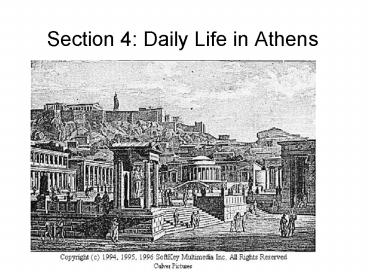Section 4: Daily Life in Athens - PowerPoint PPT Presentation
1 / 22
Title:
Section 4: Daily Life in Athens
Description:
The new bride was subject to the control of her mother-in-law and she had to be ... Most Greeks were poor and worked long hours in the fields ... – PowerPoint PPT presentation
Number of Views:503
Avg rating:3.0/5.0
Title: Section 4: Daily Life in Athens
1
Section 4 Daily Life in Athens
2
Section 4 Daily Life in Athens
The Story Continues In most city-states, private
and public life were carefully balanced. As far
as we know, citizens of most Greek city-states,
except Sparta, lived their daily lives in much
the same way as the people of Athens. Their days
were filled with work, family, and educational
pursuits.
3
I. The Athenian Economy
- Most Athenians were farmers growing olives,
grapes, and figs on terraced hillsides
4
I. The Athenian Economy
- The Athenian assembly sent farmers and workers to
colonies throughout the Mediterranean
Greece and Its Colonies, 550 B.C.
5
I. The Athenian Economy
- Colonies imported and exported goods, promoting
trade and spreading Greek culture
The dangers of drinking too much wine
6
II. Home and Family Life
- Athenians built magnificent temples and other
public buildings to show pride in their city
7
II. Home and Family Life
- Most Athenian homes were simple - made of
sun-dried brick without plumbing
8
II. Home and Family Life
- Marriage and family life were very important and
parents always arranged marriages
A woman was regarded as the property of her
father and then of her husband until she died. If
a daughter did not get married, she remained the
property of her father, and became a dishonor for
the family and a financial burden. The new bride
was subject to the control of her mother-in-law
and she had to be obedient to her in-laws.
9
II. Home and Family Life
- The main purpose of marriage was children, but if
parents could not afford to raise the baby, it
was left to die
10
II. Home and Family Life
- Parents loved their children the female poet
Sappho wrote an ode to her daughter
Poets Sappho and Alcaeus, who flourished in the
42 Olympiad (612-609 B.C.)
11
II. Home and Family Life
- Legally and socially, Athenian women were
considered inferior to men
Girls were treated as daughters all of their
lives while boys came of age at eighteen. Greek
society was patriarchal -- it was controlled by
men and did not allow women full political and
social rights. Men tended to behave more like
fathers toward women. Thus, if a woman got
married she passed from the authority of one man
(her father) into that of another (her husband).
12
II. Home and Family Life
- Women could not own property and could not appear
in public without their husbands permission
If there was no son to inherit the family
property, then a daughter would inherit the
property. She was expected to marry a close
relative chosen by her father so that he might
inherit the land.
13
II. Home and Family Life
- A womans duties included managing the household
and slaves and raising children
A husband expected his wife to be already skilled
in domestic tasks, such as weaving, spinning,
cooking, cleaning, and managing slaves. Marrying
a young girl was thought to be a very positive
thing by the men in ancient Greece because she
could be taught good habits
14
II. Home and Family Life
- Boys seven and older were cared for by a
pedagogue, a male slave who taught the boy manners
The word "pedagogue" comes from Greek Antiquity,
where it referred to the slave who led his
master's children to school
15
II. Home and Family Life
- Girls stayed at home and learned to run the
household
In Athens, as in most Greek city-states except
Sparta, girls stayed at home until they were
married. Like their mother, they could attend
certain festivals, funerals, and visit neighbors
for brief periods of time. Their job was to help
their mother, and to help in the fields, if
necessary
16
III. Education and Military Service
- Most Greeks were poor and worked long hours in
the fields
Agriculture was the foundation of the Ancient
Greek economy. Nearly 80 of the population was
involved in this activity
17
III. Education and Military Service
- Wealthy men engaged in politics, intellectual
conversations and gossip, and athletic activities
Athens Agora
18
III. Education and Military Service
- Athenians valued education boys studied reading,
writing, grammar, poetry, music, and gymnastics
19
III. Education and Military Service
- Athenians stressed the ideal of a sound mind in a
healthy body
20
III. Education and Military Service
- 400s B.C. - schools for older boys were opened by
men called Sophists
Near the end of the 5th century BC, a growing
demand for education spawned a class of teachers
known as sophists. They traveled throughout
Greece, giving lectures and teaching students.
21
III. Education and Military Service
- Sophists taught government, mathematics, ethics,
and rhetoric
Socrates, Plato, and Aristotle all criticized the
sophists, the traveling professional teachers who
taught pupils a variety of subjects, especially
rhetoric, the art of persuasive speaking. The
sophists taught people how to make the weaker
argument appear the stronger. They were more
interested in winning an argument than in
discovering truth.
22
III. Education and Military Service
- At age 18, males received military training and
then served a year either as hoplites, light
infantry, or warship rowers
The Greek Phalanx































